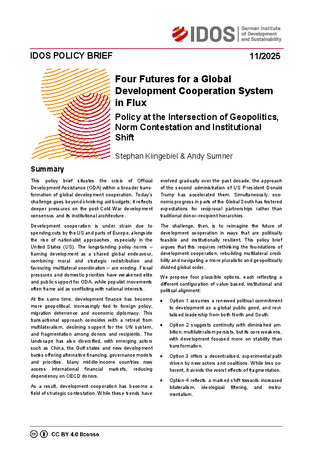Four futures for a Global development cooperation system in flux: policy at the intersection of geopolitics, norm contestation and institutional shift
Klingebiel, Stephan / Andy SumnerPolicy Brief (11/2025)
Bonn: German Institute of Development and Sustainability (IDOS)
DOI: https://doi.org/10.23661/ipb11.2025
This policy brief situates the crisis of Official Development Assistance (ODA) within a broader transformation of global development cooperation. Today’s challenge goes beyond shrinking aid budgets; it reflects deeper pressures on the post-Cold War development consensus and its institutional architecture. Development cooperation is under strain due to spending cuts by the US and parts of Europe, alongside the rise of nationalist approaches, especially in the United States (US). The longstanding policy norms – framing development as a shared global endeavour, combining moral and strategic redistribution and favouring multilateral coordination – are eroding. Fiscal pressures and domestic priorities have weakened elite and public support for ODA, while populist movements often frame aid as conflicting with national interests. At the same time, development finance has become more geopolitical, increasingly tied to foreign policy, migration deterrence and economic diplomacy. This transactional approach coincides with a retreat from multilateralism, declining support for the UN system, and fragmentation among donors and recipients. The landscape has also diversified, with emerging actors such as China, the Gulf states and new development banks offering alternative financing, governance models and priorities. Many middle-income countries now access international financial markets, reducing dependency on OECD donors. As a result, development cooperation has become a field of strategic contestation. While these trends have evolved gradually over the past decade, the approach of the second administration of US President Donald Trump has accelerated them. Simultaneously, economic progress in parts of the Global South has fostered expectations for reciprocal partnerships rather than traditional donor–recipient hierarchies. The challenge, then, is to reimagine the future of development cooperation in ways that are politically feasible and institutionally resilient. This policy brief argues that this requires rethinking the foundations of development cooperation, rebuilding multilateral credibility and navigating a more pluralistic and geopolitically divided global order.
We propose four plausible options, each reflecting a different configuration of value-based, institutional and political alignment:
• Option 1 assumes a renewed political commitment to development as a global public good, and revitalised leadership from both North and South.
• Option 2 suggests continuity with diminished ambition: multilateralism persists, but its core weakens, with development focused more on stability than transformation.
• Option 3 offers a decentralised, experimental path driven by new actors and coalitions. While less coherent, it avoids the worst effects of fragmentation.
• Option 4 reflects a marked shift towards increased bilateralism, ideological filtering, and instrumentalism.


